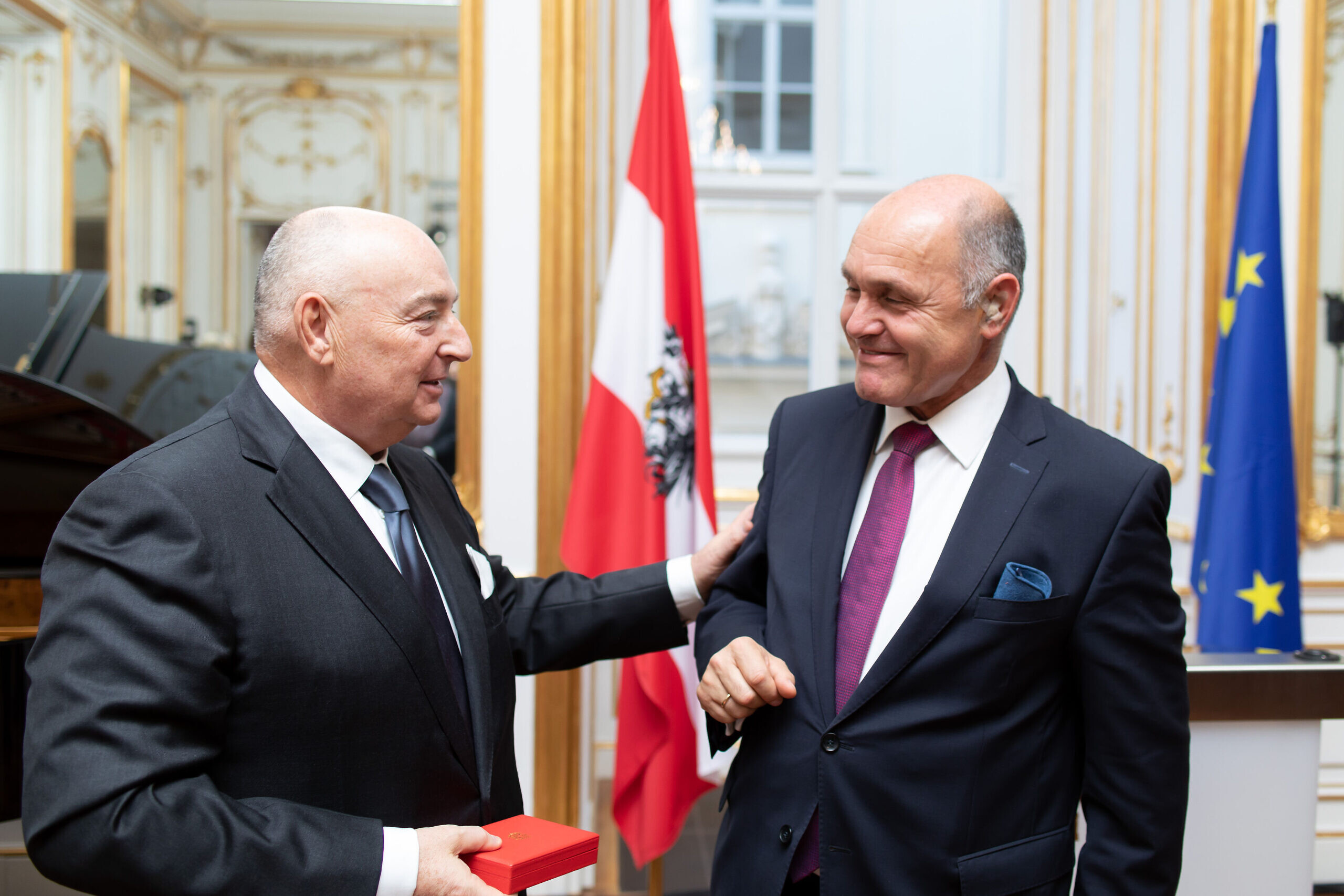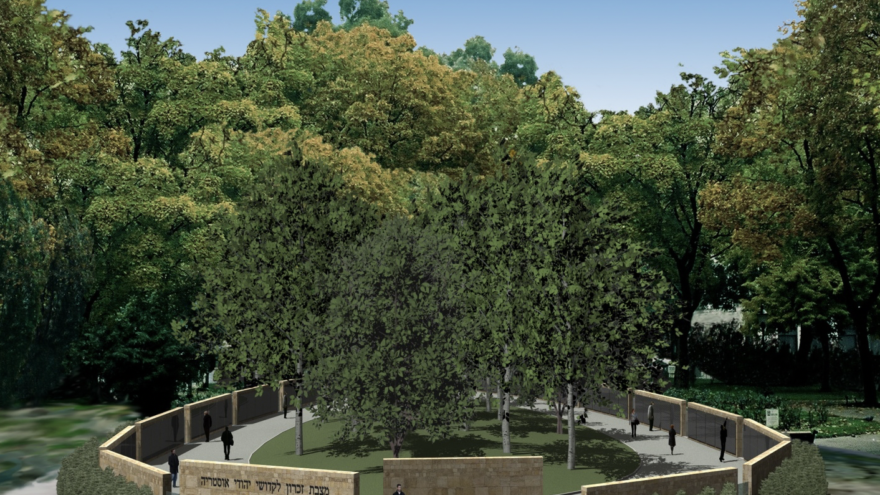On the 83rd anniversary of Kristallnacht and in a clear gesture that it is finally taking public responsibility for its past, the government of Austria unveiled the Shoah Wall of Names Memorial, its first public Holocaust memorial. Located in Ostarrichi Park in the center of Vienna, it pays tribute to the 64,440 Austrian Jewish children, women and men who lost their lives during the Holocaust. Construction work on the memorial began in March 2020.
The ceremony was attended by Austria’s new Chancellor, Alexander Schallenberg; the Speaker of the Austrian Parliament Wolfgang Subotka; ministers and senior government; and officials from the European Union and members of the Jewish community. Israeli Minister of Diaspora Affairs Nachman Shai addressed the audience as the official representative of the State of Israel. Austrian President Alexander van der Bellen was scheduled to attend but is in quarantine after his secretary was diagnosed with COVID-19.
In his speech, Shai pointed to rising numbers of anti-Semitism across Europe and around the world. In Austria alone, there was a 6.4 percent increase in anti-Semitic cases and 585 hate crimes recorded online and offline last year.
The memorial is made up of 180 “Kashmir Gold” granite slabs. Each slab is 1 meter (3.2 feet) wide and 2 (6.5 feet) meters high. They were produced in India, the only location where they are available. After first being shipped to Italy where they were polished, they arrived in Vienna for engraving, which took seven months to complete.
Earlier in the day, a wreath-laying ceremony took place at the Judenplatz Holocaust Memorial site. Judenplatz was the center of Jewish life in Vienna during the Middle Ages. Today, the “Nameless Library” memorial—made of concrete and depicting rows of inverted nameless books representing the many victims of the Holocaust—stands at one end of the plaza. The memorial does not include the names of Austrian Jews killed in the Holocaust.
Afterwards, Moshe Kantor, president of the European Jewish Congress (EJC), was awarded the Grand Decoration of Honour in Gold for Services to the Republic of Austria. This prestigious national honor was bestowed on him by the president of the Austrian National Council, Austria’s parliament, Wolfgang Sobotka, for “his fight against anti-Semitism, racism, extremism and intolerance and for greatly contributing to preserving the memory of the Shoah and revitalizing Jewish life in Europe.”

The Grand Decoration of Honour in Gold is Austria’s highest distinction and has been bestowed on various monarchs, including Britain’s Queen Elizabeth II, Sweden’s King Carl XVI Gustaf and Queen Silvia, as well as international leaders and fighters against racism, such as the late French president Jacques Chirac, and former Nazi hunter Simon Wiesenthal.
“I am honored to receive this award from the Republic of Austria,” said Kantor, “because it is a nation that has taken its role in the fight against anti-Semitism very seriously. It has led the way on many issues, including giving Holocaust survivors a priority in receiving COVID vaccines and safeguarding a Jewish future, and I remain ready, willing and available to assist Austria in meeting these challenges. I pledge that I will endeavor to continue serving not only the interests of the Austrian Jewish community but also those of the entire Austrian society.”
He thanked the government of Austria for its “comprehensive response in securing and promoting Jewish life” and highlighted the “excellent cooperation and high-level of trust between the Jewish community and the authorities, which serve as an example to the rest of Europe.”
“None of this would have been possible without the systematic efforts of IKG president Oskar Deutsch, and honorary president and European Jewish Congress vice president Ariel Muzicant. That is why I consider that this decoration is not only presented to me personally but to the Jewish community of Austria and its leaders.”
Five-part study: ‘An End to Anti-Semitism!’
In addition, Kantor presented an unprecedented and detailed study—titled “An End to Antisemitism!”—conducted under the patronage of Sobotka, the city of Vienna and the EJC. Comprising a five-volume book series, the study is the outcome of an international high-level conference held in Vienna in 2018 as a collaboration between the University of Vienna, together with New York and Tel Aviv universities, and the EJC.
“This is the most ambitious study of the problem of anti-Semitism,” said Kantor, speaking at the official release of the publication. “More importantly, it details the groundwork for a united and concerted preventive action plan for society today and in the future.”
“We want to create an academic platform on which we can develop other, much simpler and clearer instruments,” Kantor told JNS.
“In every democratic state constitution, there should be a direct law that prohibits anti-Semitism in all forms,” he said. “Second, these books will give an academic platform for the very important social media. People today are losing the ability to receive long-term education. We need to create something which is easy to digest and understand from the first word.”
Kantor spoke of the need to speak the same language as young people. “They do have a different vocabulary,” he said. We have to come to them and not wait for them to come to us.
And he talked of the requirement to ensure that this research is made available to young people in every country. One idea, he said, is to enlist social-media influencers.
“Our objective is to distribute this study as widely as possible so that it can be used as a force multiplier by governments, academics, religious institutions, the media and other organizations.”
Its goals are to prevent further Jew-hatred as it manifests in the current political and social climate and into the future. A total of 119 international experts scrutinize the multi-faceted problem of anti-Semitism and shed light on its history and specific features. Based on their analysis, they offer recommendations for a joint and effective fight against anti-Semitism.
Among the authors are renowned political and religious decision-makers, including Katharina von Schnurbein (European Commission Coordinator on Combating Anti-Semitism), Natan Sharansky (former chairman of the Jewish Agency for Israel), Archbishop Pierbattista Pizzaballa (Apostolic Administrator of the Latin Patriarchate of Jerusalem) and Imam Hassen Chalghoumi (president of the Conférence des Imams de France).
The study comprises five parts. The first offers practical solutions and recommendations for decision-makers; the second deals with Jew-hatred in religion; the third deals with the history of anti-Semitism; the fourth with its role in philosophy, pedagogy and social sciences; and the fifth explores manifestations in modern media, and in the legal and political worlds.
“Eighty-three years after Kristallnacht and 76 years after the end of the Shoah, hatred, disinformation, conspiracy theories about Jews and the Jewish state are more than ever circulating online and poisoning hearts and minds,” said Kantor. “Thanks to significant efforts around Europe, we are seeing great progress at the political level. Nonetheless, the problem of anti-Semitism in society is unfortunately getting worse.”
Responding to a question of how it’s possible to reverse hateful ideologies that some of today’s youth are exposed to, Kantor said he believes that social media has become more influential on youth than family education.
“We have to find the way,” he insisted. “We have to speak their language and to their values.”


























